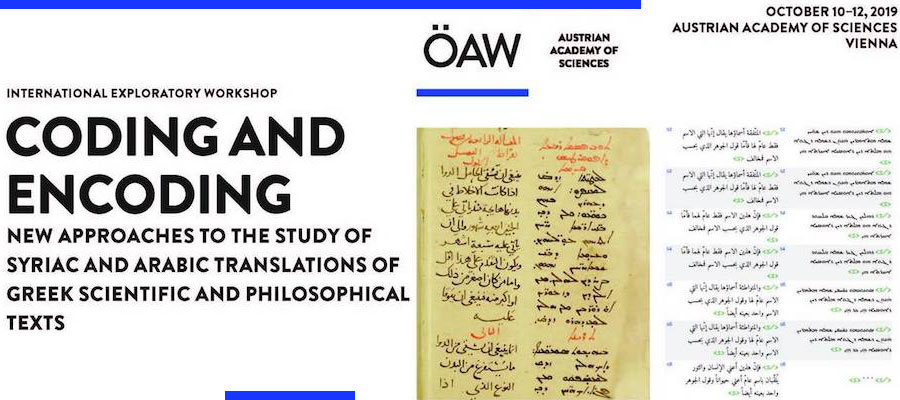Coding and Encoding: New Approaches to the Study of Syriac and Arabic Translations of Greek Scientific and Philosophical Texts, International Exploratory Workshop, Austrian Academy of Sciences, October 10–12, 2019
The ERC project HUNAYNNET: Transmission of Classical Scientific and Philosophical Literature from Greek into Syriac and Arabic organized International Exploratory Workshop "Coding and Encoding: New Approaches to the Study of Syriac and Arabic Translations of Greek Scientific and Philosophical Texts" will take place October 10–12, 2019 at the Austrian Academy of Sciences, Vienna.
The object of HUNAYNNET is to study the late antique and medieval translations into Syriac and Arabic of ancient Greek philosophical and scientific works. It is the first attempt at compiling a digital trilingual and linguistically annotated parallel corpus of Greek classical scientific and philosophical literature and the Syriac and Arabic translations thereof. The workshop will focus on the the dissemination of ancient Greek philosophy and science through translations into Syriac (Aramaic) and Arabic.
The workshop will open with a keynote lecture by Dimitri Gutas, Yale University: Graeco-Arabic Studies beyond Greek and Arabic: Integrating the Western Humanities Canon.
Lecture Abstract
A survey of the history, nature, present state, and significance of Graeco-Syro-Arabic studies, and its development into a humanistic discipline that redefines and methodologically re-orients the history of science and philosophy in the societies of the West (of India) from antiquity to the Renaissance, and illuminates their social and ideological histories; in essence, it integrates the Western humanities canon of the major languages (but not only) of Greek, Syriac, Arabic, Latin, and Hebrew. The philological work at its core, for which it is mostly (but incompletely) known, will be discussed with references to the research currently undertaken during the conference and elsewhere. The philological core provides material for the study of the social and ideological history of the societies named, and it also offers a methodological blueprint for the study of the history of science and philosophy during the said period, an example of which will be given from the project on Aristotle's 'Poetics' conducted at the Free University in Berlin under the aegis of the Einstein Stiftung.
